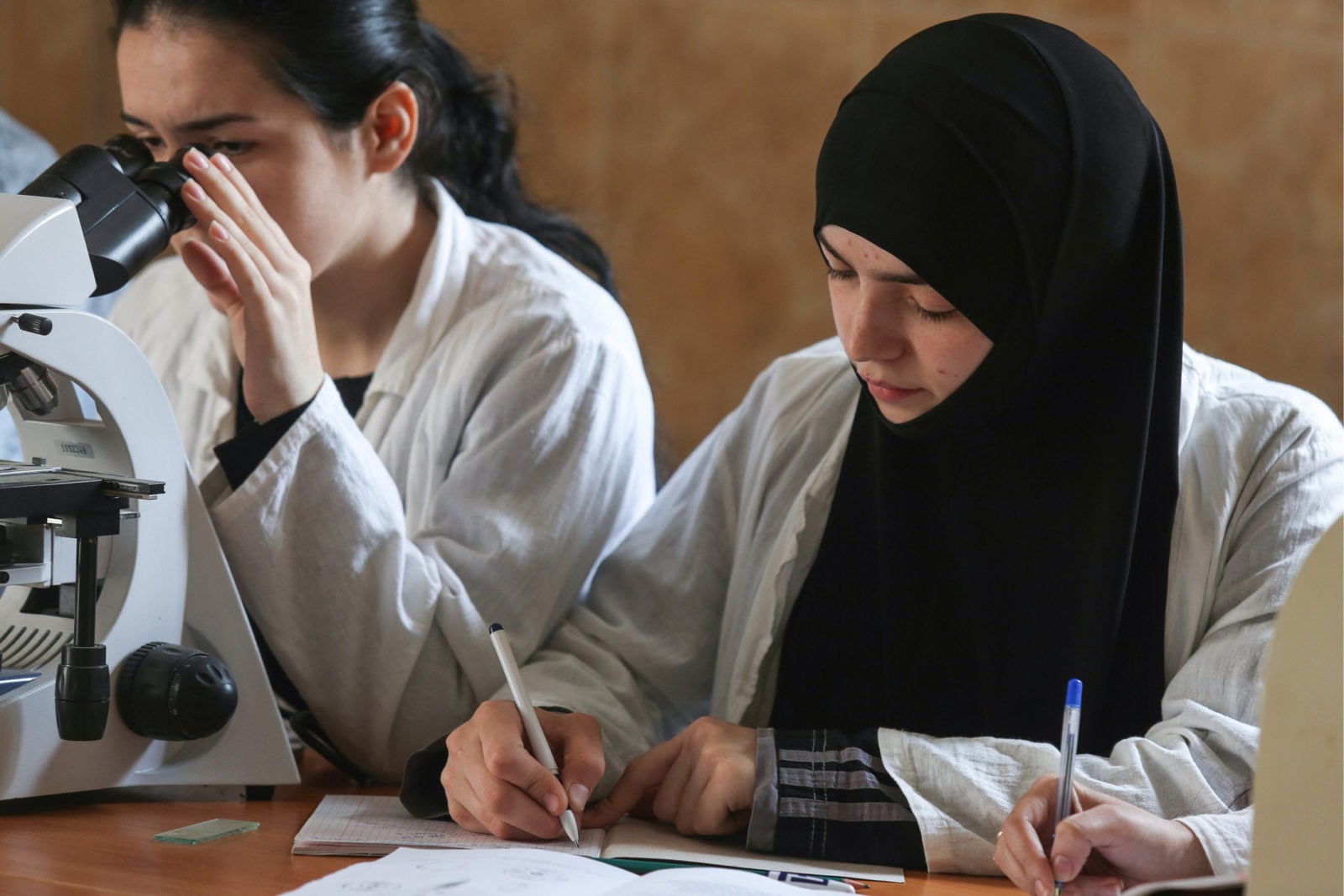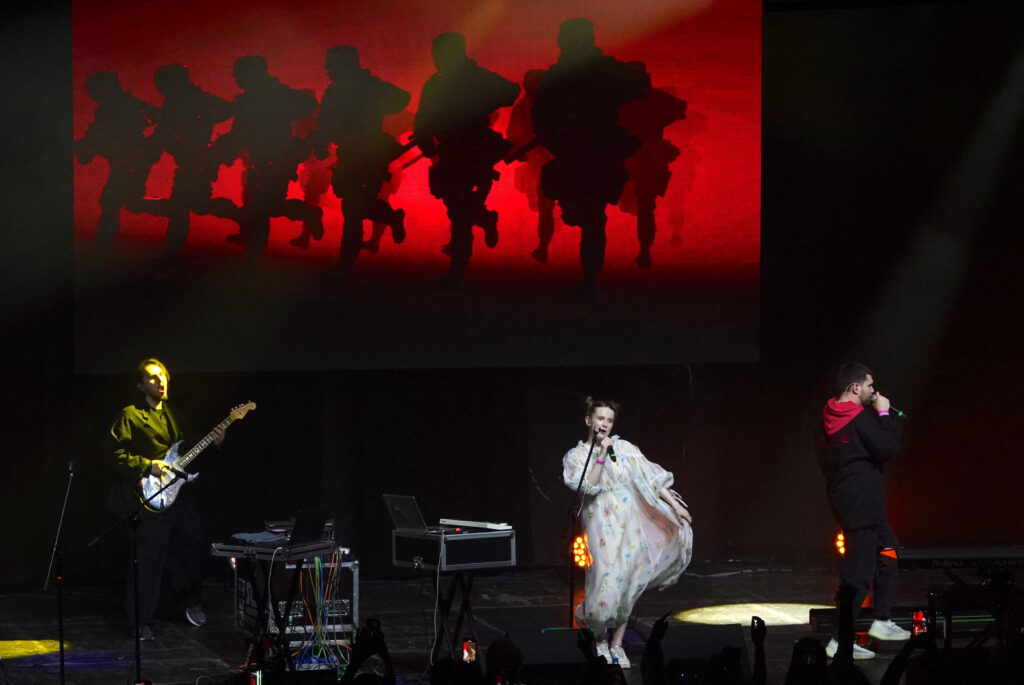After the collapse of the Soviet Union, interest in religion blossomed in Dagestan. Traditional Dagestani movements were revived, and new ones appeared, introduced by young people who started to take advantage of new opportunities to study in Islamic centers in the Middle East. These re-islamization processes are currently perceived differently by various social groups. young people in large cities see it rather negatively, motivating them to move away from the republic in search of a more secular environment. Others, including young women, become religious independently, often in defiance of their relatives. For them, Islam becomes a way to have their own distinct identity in opposition to the values of their parents’ ‘Soviet’ generation. In such a case, young women often learn Arabic and read the Koran themselves rather than an interpretation of it, which, contrary to what might be expected, leads them to understand their own self-worth, often justifying their right to education, to do business, or to participate in socially significant decision-making by direct reference to the Koran.
The situation of official Islamic education, which started to spread around the same time in the early post-Soviet period, is somewhat different. To begin with, it can be said that the Islamic educational institutions established by the muftiat of the Russian Federation are one of the many social puzzles of Dagestani society. At the moment, this type of Islamic education cannot be described as dominant or even widespread (there are six such Islamic universities in Dagestan), but gradually, more and more young people are entering this educational sphere. Mostly men study in these universities, but it is through the example of women’s departments that the values they disseminate can be most clearly seen.
There are women’s departments in the Islamic universities in Makhachkala, Buinaksk, and Derbent. Men and women are thus educated separately, and the contents of their curricula differ (the latter department has a ‘simpler’ curriculum, as disciplines related to Islamic law and preparatory subjects for future imams are excluded from the women’s course). Yet another key difference in educational approaches is the much larger emphasis placed on parenting with female students. Teachers from the women’s department in Derbent note that «more attention is paid to raising children, as it is the vocation of women, while [men] in our society have various other goals.» Educational programs are made to correspond to these expectations and include ‘women’s’ roles in making behavior rules for the family, communicating with one’s husband and relatives, parenting, etc. Obtaining a secular education in parallel to Islamic education is not prohibited, but as a rule this is purely limited to practical skills that can help a woman in her everyday life: sewing, nursing courses, etc.; in some cases, young women study these subjects on campus or by distance learning at other universities.
Teachers in women’s departments note that with rare exceptions, parents are eager to let their daughters study at Islamic universities because of the strict discipline at these institutions; in Buinaksk, for example, students are not allowed to go out into the city unaccompanied. The administration of the women’s departments in the Islamic University of Derbent commented: «After leaving school, girls start to express their opinions and show their character, their ego. Our task is to give them an upbringing… Parents, even if they were doubtful at first, are grateful later.»
The moral education provided in this Islamic system, as it concerns women, seems to be rather effective, forming a trusting environment both during studies and after young women’s graduation from the university. Staff in women’s departments at Islamic educational institutions say that applicants like the teaching system, the atmosphere of trust and solidarity, and so on. Moreover, the divorce rate among graduates is actually close to zero percent, a result of the fact that girls see their teachers as people to confide in during times of crisis, acting as a sort of psychological counseling hotline.
Incidentally, the family rights of these young women are somewhat well-protected from a religious point of view, such that in the type of situation where a husband might forbid his wife from activities related to religious observance (including studying in an Islamic university), a woman’s protests would be seen as legitimate. In this situation the religious community may even go as far as approving divorce. Feelings of dissatisfaction with other aspects of family life is met with lectures on the importance of obedience, but it should be understood that as a rule, the doctrine of patience toward the powerful is characteristic of Islamic teaching. This is most clearly reflected in the hadith «sixty years of a tyrannical imam are better than one night without him». That is to say, in Arabo-Islamic teachings, only apostasy can be a pretext for expressing discontent with a ruler, just as it is for women in the home.
As concerns the matter of how to include female students at Islamic universities and madrassa students in public spaces, here the doctrine is much more unequivocal. As a rule, they are required to be modest by all accounts and should not interfere in secular affairs, boiling down to the idea that «our girls won’t get anywhere». Public activism is considered unacceptable for women, because it allegedly leads to fitna (unrest). Moreover, it is «unadvisable for them to stand out on social media», so students are almost completely cut off from the digital sphere (it should be said that there are strong restrictions on, for example, the use of phones in men’s departments too); however, devices that do not connect to the Internet are sometimes allowed, so girls living in dormitories on campus can contact their relatives either at a specific time of day or in the presence of teachers.
For women specifically, lessons are given in a Q & A format with the goal of introducing students to Islamic traditions. In the pool of books approved by the Expert Council of the Spiritual Board of Muslims in Dagestan that serves as their reading list, there are such titles as «Secrets of Family Life and Secrets of Marital Relations», «How to Become a Beloved Bride», «The Righteous Muslim», «How to Choose the Right Wife», etc. Within such an information vacuum, the values transmitted through these readings — piety, integrity, docility, discrete public behavior, frugality, contentment with modest means, gratitude, and obedience to husbands and their relatives — are accepted uncritically. Only rarely would one hear uncertainty about whether the Koran directly refers toward women’s subordinate position in society.
Freedom of thought is openly reproached — «a woman who thinks that freedom and emancipation is a quick way to a man’s heart is deprived of femininity. She does not know that men shudder to look at the appearance of so-called free women» («How to Become a Beloved Wife», p. 3) — and additionally, Muslim women’s employment is also regulated — «a woman who wishes to work must obtain consent from her husband, father, brother, guardian» («The Righteous Muslim Woman», p. 37). The possibility of romantic relationships in the workplace is only the first among many other undesirable potential consequences of women working outside the home, so it is preferable that her work does not take up a lot of time and is associated with ‘feminine’ areas, such as education, healthcare (especially gynecology), making women’s clothing, counseling services, etc.
On this issue, Islamic conservatism is complemented by the government’s measures to increase the birth rate, in particular with the introduction of a monthly allowance for women with children of up to 18 months old. Although earlier women would only receive this money if they had an above-board job, now they can get it even without professional experience, a change that has played an important role with the socio-demographic development of the region.
Most of the young women studying at Islamic universities — and this is acknowledged with pride by female employees of women’s departments — go to study ‘for themselves’, to increase their chances of finding a husband and applying their knowledge to their family life. Marriage is the only approved life path for women, and all educational efforts are somehow or another tied to it (whereas in men’s departments, classes on the fundamentals of family life and on rules of family behavior are not offered).
Marriage among madrassa students and students in Islamic universities officially happens through matchmaking, i.e., the families of the bride and groom make an agreement and the young married couple meet one another on the eve of their wedding or on the day. It should be noted here that in Dagestan, as a rule, matchmaking is not perceived as a phenomenon that infringes upon women’s rights and freedoms by most young women. Instead it is more likely seen as a fast and convenient way to start their life, as marriage is seen as a best-case scenario, and, besides, it means that young people do not have to put effort into finding a partner — their relatives do it for them. The informational isolation also plays a role here: while ‘secular’ girls have the opportunity to meet young people in real life and communicate with them through social media, female students of Islamic universities do not even theoretically have a chance to find someone this way. This means they do not feel deprived of a choice; if the young women herself has no opportunity to choose anyway, handing over the choice to relatives is not a cause for worry.
So if for men, Islamic education gives opportunities for growth and career development, albeit limited ones, for women it is not even a fully theological education. The only indisputable advantage — which is quite a considerable one — is developing a good knowledge of Arabic, which theoretically opens up opportunities for further education or work in, for example, the Middle East. But while some male graduates have in the past left the country for foreign internships, the same is not known to have happened for female graduates. So even the path of translator is closed to them. This is to say that the knowledge of Arabic is locked to the very system of Islamic education; only there is it permissible for women to deliver training or teaching.
The real motivation of young women going to this type of education institution is not easy to determine, as it can only be done by conducting in-depth interviews with them individually and experiencing their environment. But this is a difficult task, as it is immediately obvious that the Islamic education system hinders its students’ participation in public processes — they are discouraged from expressing their own opinions, dissatisfaction with the status quo, etc. — and this applies to women most of all. Although similarly highly ideological education can be seen in Orthodox and other theological schools, the situation in Islamic universities may be further exacerbated in the future by the growing demand for Islam in the region and the authorities’ attempts to use these institutions in the war on extremism.










